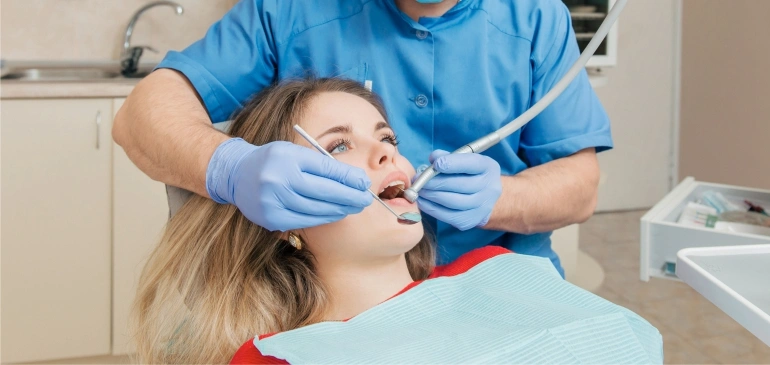Teeth sensitivity is a common dental issue that affects millions of people worldwide. The good news is that effective treatments are available to help alleviate the discomfort and sensitivity of this condition.
So, if you are tired of avoiding your favorite foods and beverages, keep reading to discover how you can find relief and enjoy a pain-free smile.
Ways To Treat Teeth Sensitivity?
When it comes to treating teeth sensitivity, there are several effective methods available.
Here are some common ways to treat dental sensitivity and find relief-
-
Desensitizing toothpaste
Switching to a toothpaste specifically designed for sensitive teeth can make a significant difference. These kinds of toothpaste contain compounds like potassium nitrate or strontium chloride that help block the transmission of pain signals and build a protective barrier over the exposed dentin. Use the toothpaste regularly as part of your oral hygiene routine for best results.
-
Fluoride treatment
Your dentist may recommend in-office fluoride treatments to help strengthen the enamel and reduce sensitivity. These treatments involve applying a concentrated fluoride gel or varnish to the teeth, which helps to re-mineralize and fortify the enamel.
-
Dental bonding
In cases of severe sensitivity, your dentist may suggest dental bonding. This procedure involves applying a tooth-colored resin to the sensitive areas of the teeth. The resin is a barrier, protecting the exposed dentin and reducing sensitivity.
-
Dental sealants
Sealants are thin coatings that your dentist can apply to the chewing surfaces of your back teeth. They create a protective layer that helps shield the enamel from decay and sensitivity.
-
Avoiding triggers
Identifying and avoiding triggers that exacerbate sensitivity can provide significant relief. For example, if cold or hot foods and drinks trigger sensitivity, try to consume them at a moderate temperature or use a straw to minimize contact with your teeth.
-
Dental hygiene adjustments
Your dentist may suggest you oral hygiene routine changes to help manage sensitivity. A soft-bristled toothbrush and gentle brushing techniques can help prevent further enamel erosion. Additionally, your dentist may recommend a desensitizing mouthwash or fluoride rinse for daily use.
-
Mouthguards
If teeth grinding or clenching (bruxism) is causing your sensitivity, your dentist may recommend wearing a custom-made mouthguard while you sleep. The mouthguard cushion prevents excessive pressure on your teeth and reduces sensitivity.
-
Dietary changes
Limiting your intake of acidic foods and beverages can help protect your enamel and minimize sensitivity. Avoiding or reducing consumption of citrus fruits, sodas, sports drinks, and other acidic substances is best.
-
Professional dental treatments
In some cases, more extensive dental treatments may be necessary to address the underlying sensitivity causes. These may include dental restorations, root canal therapy, or gum grafts to repair damaged teeth or receding gums.
Following their guidance, you can effectively manage teeth sensitivity and enjoy a pain-free smile.
Remember, it’s essential to consult with your dentist to determine the best course of action for your specific situation. They can evaluate the extent of your sensitivity and provide personalized recommendations to alleviate your discomfort.
Get Professional Teeth Sensitivity Treatment Today!
Sensitive teeth can be a nuisance, but you don’t need to suffer more. Our dedicated team at Pinnacle Dental is here to provide you with the best teeth sensitivity treatment available.
Contact us now to book your appointment for Sensitivity treatment. With our state-of-the-art techniques and compassionate care, we will address the root cause of your sensitivity and develop a customized treatment plan just for you.



Leave a Reply